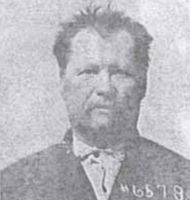 The Montana Sedition Project
In February 1918, during what would turn out to be the final year of World War I, Montana adopted a sedition law criminalizing wartime statements against the United States government and its role in the war. This law allowed for a maximum penalty of $20,000 and up to 20 years in prison.
Montana was not unique in adopting a sedition law during this time period. Congress enacted the Espionage Act after the U.S. entered the War in 1917, and many states followed with their own legislation to punish speech viewed as seditious. A federal law specifically targeting sedition was enacted by Congress in 1918, and it was nearly identical to Montana’s law.
In 1918 and 1919, 79 men and women were convicted of violating Montana’s sedition law. Most of those convicted were blue-collar workers, and more than half were immigrants from Europe. These 79 individuals served more than 65 months in prison.
In 1918, Josef Hocevar, a 52-year-old Austrian immigrant, worked as a miner in Roundup, Montana. Two witnesses reported that Hocevar made anti-American statements, which included the use of profane language, when drinking with other miners at the Roadside Saloon on October 4. He was alleged to have criticized President Woodrow Wilson’s character and unfavorably compared the government of the United States to those of Germany and Austria.
Hocevar was charged with sedition. His case went to trial in February 1919 – by which time the war had ended – in the Musselshell County District Court before Judge George P. Jones. Based on witness testimony, the jury found Hocevar guilty on February 19, 1919. Jones sentenced him to six to 12 years in the state penitentiary. During his time at the Montana State Prison, Hocevar worked as a laundryman.
In 1921, Hocevar’s two accusers recanted their accusations and said that they had decided to accuse Hocevar of sedition when they were “crazy drunk.” After they sobered up, they had continued with their claims because they were afraid they would go to jail if they admitted the accusations were false. In addition, 200 miners from Roundup supported Hocevar’s request for a pardon, supporting his claim that he had not made the alleged statements.
In August 1921, Governor Joseph M. Dixon pardoned Hocevar, and he was released from prison on August 18, 1921.
The Montana sedition law and those who were convicted under it became an area of interest for University of Montana professors Clemens Work and Jeffrey Renz, who began collaborating on this topic in 2005. The state’s sedition law was not only contrary to First Amendment rights; it was also enforced in a way that disproportionately targeted immigrants and persons who supported organized labor. Hocevar was the only person who had received a pardon for his conviction under this law.
Work, a journalism professor, and Renz, a law professor, decided to pursue posthumous pardons for the other individuals convicted under the state’s sedition law. They brought a team of their students in on their effort to obtain the historical pardons from the governor of Montana, a state where a posthumous pardon had never before been granted.
The group’s pardon petition was presented to Governor Brian Schweitzer on April 13, 2006. In a formal ceremony at the capitol rotunda in Helena on May 3, 2006, Governor Schweitzer granted all the requested pardons. “I’m going to say what Governor Sam Stewart should have said,” Governor Schweitzer said, referencing the governor who signed the sedition legislation. “I’m sorry, forgive me, and God bless America, because we can criticize our government.”
- Meghan Barrett Cousino |